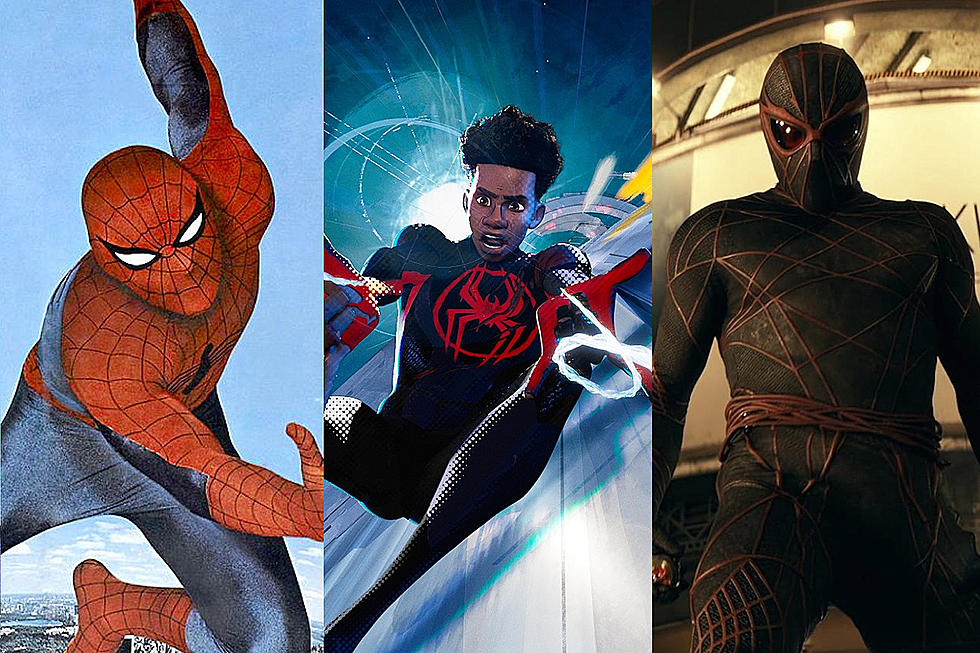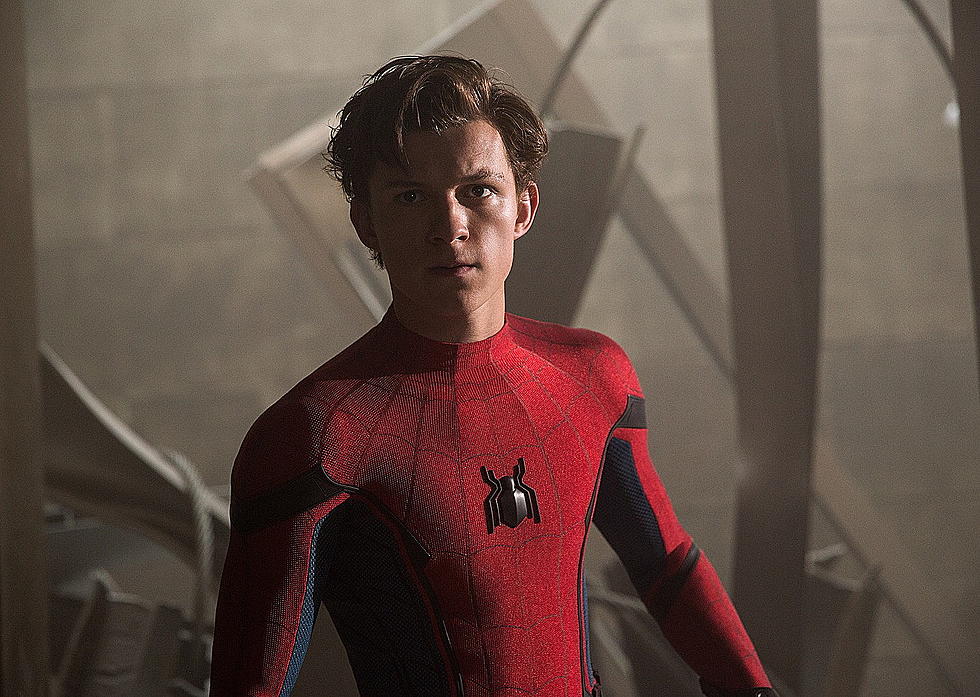![‘Mighty Avengers’ #1: Racial Dynamics, Disenfranchised Youth And Absent Dreadlocks [Review]](http://townsquare.media/site/622/files/2013/08/Mighty-Avengers-hed.png?w=980&q=75)
‘Mighty Avengers’ #1: Racial Dynamics, Disenfranchised Youth And Absent Dreadlocks [Review]
Depending on who you ask, Mighty Avengers #1 is either a big deal or completely unnecessary. To some, it represents a significant moment: Marvel putting sincere thought and effort into publishing a super hero title starring a cast of characters who are mostly persons of color. To others, it's an idea that's "contrived" or "forced," taking away jobs from hardworking, honest, god-fearing, and completely fictional white people. That, or it's yet another Avengers title from the publisher, and there are some who already complain that there are far too many.
But wherever your feelings lie, what matters most -- what should matter most -- is whether or not Mighty Avengers is a good comic. Written by Al Ewing and with art by Greg Land, Jay Leisten and Frank D'Armata, Mighty Avengers #1 is, in many ways, a very promising start.
Before anything else, though, I need to address one thing I've yet to mention in previous coverage: the logo. The Mighty Avengers logo is terrible. It has a similar design to other Avengers logos, except there's graffiti involved, because "OMG BLACK PEOPLE!!!" Remember the "Itchy & Scratchy & Poochie" episode of The Simpsons, when they're designing Poochie and the stereotypically tone deaf TV executive says "I feel we should Rastafy him by about 10% or so?" That's basically what someone said when they were coming up with designs for this. This logo is the Poochie of Marvel Comics. I suppose it could be worse, though. They could have made the "s" In Avengers into a dollar sign. I'm just kidding, of course. No one would ever do that.
The issue starts, as all comics should, with Thanos. This is the first of several voices that Ewing handles well. His Thanos is calm, patient, and scary. He and his assistant/accomplice Proxima are plotting their attack on the seemingly defenseless Earth, as the Avengers are off in space, which segues to...
The Plunderer! It's amazing how much of a boon Marvel's wealth of B-List villains is. They get a lot of mileage out of them, and more often than not it works. Anyway, the Plunderer is attacking Horizon Labs, which is under protection from the Heroes For Hire, currently consisting of Luke Cage, White Tiger, and the new Power Man. I like the idea that the team of PoC characters rates so low that they're stuck going up against Parnival Plunder. It's a smart introduction to the squad, and it leads to some great dialogue from Ewing as the three fight off his henchman. Then Otto Octavius/Spider-Man shows up, doing his whole elitist schtick, and we get an exchange that I absolutely love:
Here you have Doctor Octopus, a villainous white man currently wearing the mask of an actual hero and attempting to atone for past mistakes, lecturing and judging Luke Cage, a black man who gained his powers during a prison experiment after being wrongfully arrested, who is now a husband and father trying to make money to support his family. You don't have to acknowledge the racial dynamics present in this conversation for it to still resonate, but they're very clearly there. Octavius literally calls them thugs.
It's one of many well-crafted exchanges in the book. Ewing has a strong handle on the dialogue throughout the story. Whether it's an argument with Spider-Ock or Cage and the new Power Man arguing over coffee in a diner, it all feels natural.
The Spider-Ock argument is followed by the introduction of Monica Rambeau, now known as Spectrum. When I was a kid I read an issue of The Avengers that featured Monica going down to Louisiana to have a meal and hang out with her parents, and for some reason I've loved her ever sense. This is why it frustrates me that she hasn't been used in recent years nearly as much as I'd like (save for Nextwave, which was amazing). Monica was Captain Marvel, and an Avenger, for years and all she got was a single one-shot. Carol Danvers was Captain Marvel for an hour and got her own monthly series. Alas.
Monica shows up in New York City just in time to fight Blue Streak, another B-List villain (Ewing's used that device twice now, and it's worked each time). She's is a little bit flexible as a character, in terms of her personality, and Ewing aims to make her a bit lighter in this series, or less "scary-angry," which I appreciate.
After taking out Blue Streak, she goes to visit Luc, who designed her new costume:
I have mixed feelings about Monica's new look. Until recently, she was rocking a trench coat, a style she now seems to have (understandably) gotten over. I'm probably completely over analyzing, but I can't help but think that's a slight shot at DC Comics' recent costume designs. Or, you know, Gambit. Either way, I really wish she'd go back to the afro or dreads. And now that I've said that, somewhere out there my mother and grandmother are shaking their heads, deeply disappointed by this opinion. But it really bothers me that Monica says "I'm trying not to be scary-angry" anymore, and part of the narrative of no longer being scary-angry is losing the dreads and straightening her hair. That's a deeply complex issue on a lot of levels, though, and one that requires its own lengthy post. So let's just move on for now.
Luc mentions that Monica had a gentleman caller when she was gone. This leads to the introduction of the latest Ronin, who's off in the shadows. We don't know who he is yet, but we learn three things about him: 1) Monica is less than pleased to see him, 2) Like anyone named Ronin, he carries nunchaku, and 3) When pressed to choose a costume and join a battle, he reveals that he has impeccable fashion sense.
Monica, Cage, Spidey-Ock and Ronin are united when Proxima arrives to attack New York City, which she and Thanos believe to be unprotected now that the Avengers are off in space (the X-Men clearly need better PR), and that's where the issue ends. But for Ewing, it's an auspicious beginning. Every character has a voice and personality that leads to very authentic feeling exchanges, and promises more to come. When the book was announced, Ewing promised interesting interactions between team members, and even without every character having been introduced yet (we're still waiting on She-Hulk, Blue Marvel and The Falcon), the seeds have been planted for that. I initially saw Spider-Man's presence on the team as just a way to boost sales, but so far he's a great contrast to Cage. White Tiger is a dignified and intelligent young woman, attempting to figure out exactly who it is she wants to be. Power Man is brash, confident and a little bit angry, like most teenagers who suddenly find themselves with super powers probably would be. Ewing writes Power Man as a frustrated young black man in a way that not only manages to not be off-putting or offensive, but on a personal level, is actually kind of recognizable. I could honestly write a whole post just about him.
Monica is trying to start over, but at the same time seems completely comfortable with who she is. And with Cage, Ewing continues what Brian Michael Bendis spent years doing with the character. He's evolved well past the mindset that defines this young Power Man, his protégé of sorts. Cage is a father and a husband, and is fully dedicated to both, but also wants to figure out how to reach out to the community in a way that other heroes simply can't or won't. It's a difficult balance for anyone, superhero or not, and he's struggling with it. But he may have just figured out a way he can make it all work.
Now, look, I know what you're thinking: I haven't talked about Greg Land yet. It's true, I haven't. But really, after all these years, I'm not sure what's left to say. I strongly dislike his art. Not only that, but his very presence distracts from a book. When this series was announced, I wrote a post about its significance as an Avengers title that features a cast dominated by characters who aren't white men, and what that means for both its publisher and editor. I never once talked about Land. And yet, in the comment section (for the record, those comments have since been lost), and in comment sections and message boards all over the internet, it seemed like that was all anyone wanted to discuss. You could argue it's unfair to Ewing, who does some really promising work here, and it's unfair to people who have waited years for a major Marvel title featuring characters they see as reflections of themselves. But at this point in his career, this is what Land's presence brings to any series. Sure, a lot of people on the internet hate his work, but obviously Marvel has looked at the numbers. They aren't stupid. There are people out there who enjoy seeing his art on a title. You just may not be one of them. I'm certainly not. I hold out hope that he'll be off the book by the end of the first storyline, but for now this is what we've got.
But that puts me in a tricky spot. I thoroughly enjoyed Ewing's work on Mighty Avengers #1, but comics are a visual medium, and the visuals simply do not work for me. So can I call this a good book? I'm not sure. How about this:
"Mighty Avengers #1 is an auspicious debut for Al Ewing, an extremely capable writer whose work on 2000 AD has stood out for some time. His dialogue is clever and authentic, and he handles an important title, and significant moment for Marvel, incredibly well. Ewing is a welcome addition to super hero books in the U.S. Mighty Avengers is drawn by Greg Land."
I guess that will have to do.
More From ComicsAlliance









